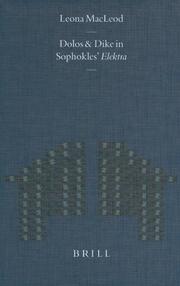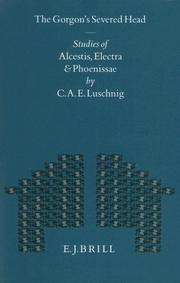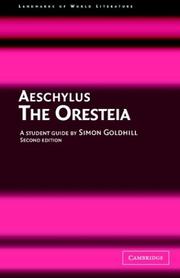| Listing 1 - 4 of 4 |
Sort by
|
Book
ISBN: 9783110188240 3110188244 9783110227376 3110227371 9783110390650 3110390655 3111740196 Year: 2016 Publisher: Berlin ; Boston : De Gruyter,
Abstract | Keywords | Export | Availability | Bookmark
 Loading...
Loading...Choose an application
- Reference Manager
- EndNote
- RefWorks (Direct export to RefWorks)
Den Mythos davon, dass Orestes und Elektra für ihren getöteten Vater Agamemnon Rache nehmen und seine Mörderin, ihre eigene Mutter Klytaimestra, umbringen, haben die drei berühmtesten attischen Tragiker – Aischylos, Sophokles und Euripides – auf die Bühne gebracht. Sophokles konzentriert sich in seinem Stück vor allem auf das Leid der isoliert bei ihrer verhassten Mutter lebenden Elektra. Seine Tragödie hat besonders seit dem 19. Jahrhundert zahlreiche moderne Dramatiker (wie etwa Hugo von Hofmannsthal, Eugene O’Neill, Jean Giraudoux oder Jean-Paul Sartre) zu Neufassungen inspiriert. Der vorliegende Kommentar erschließt den Text für moderne Leser. Er legt besonderes Gewicht darauf, die Wirkung des Bühnengeschehens auf den Zuschauer sowie die Bezüge zur modernen Rezeption des Textes zu erläutern. The mythical story of Orestes’s and Electra’s act of vengeance against their mother, Clytemnestra, was developed by Sophocles as well as Aeschylus and Euripides. In his tragedy, Sophocles focused on the suffering of Electra, living in isolation with her hated mother. This commentary places particular emphasis on the impact of the play’s events on the audience and references to the modern reception of the text.
Mythology, Greek --- Mythology, Greek. --- Electra, --- Sophocles. --- Sophocles, --- Electra (Sophocles). --- Electra --- Electra. --- Elektra. --- Greek tragedy. --- Griechische Tragödie. --- Sophokles. --- LITERARY CRITICISM / Ancient & Classical. --- Électre --- Alektra --- Ēlektra --- Elektro --- Elettra --- 厄勒克特拉 --- エーレクトラー --- אלקטרה --- 엘렉트라 --- Електра --- Электра --- الکترا --- اليكترا --- Ἀλέκτρα --- Ἠλέκτρα --- Electra - (Greek mythological figure) --- Sophocles. - Electra --- Electra (Sophocles) --- Ēlektra (Sophocles) --- Sophoclis Electra (Sophocles)

ISBN: 9004118985 9789004118980 1417590807 9781417590803 9047400593 9789047400592 1280464445 9781280464447 9786610464449 6610464448 Year: 2001 Volume: 219 Publisher: Leiden Boston Brill
Abstract | Keywords | Export | Availability | Bookmark
 Loading...
Loading...Choose an application
- Reference Manager
- EndNote
- RefWorks (Direct export to RefWorks)
The main problem facing critics of Sophokles' Elektra has always been understanding the presentation of the vengeance and the nature of justice it represents. This volume addresses the ethical issues of this play through an analysis of the language and argumentation which the characters use to explain and justify their behaviour. The focus is on the examination of the themes of aidôs and dolos , and the way in which each contributes to our overall understanding of the vengeance as an act which, for all its justice, remains shameful. By exploring the union between these two contradictory elements, this study exposes the ethical complexity of Sophokles' treatment of the vengeance theme. Dolos andamp; Dikê contains a useful critique of recent interpretative approaches to the play, a full bibliography, and a complete index of passages cited.
Electra (Greek mythology) in literature. --- Sophocles. --- Electra (Greek mythology) in literature --- Sophocles --- Sofokles --- Sophocle --- Sofocle --- Sophokles --- Sofocles --- Electra (Greek mythological figure) --- In literature --- Electra --- In literature. --- Literature. --- Belles-lettres --- Western literature (Western countries) --- World literature --- Philology --- Authors --- Authorship --- Électre --- Alektra --- Ēlektra --- Elektro --- Elettra --- 厄勒克特拉 --- エーレクトラー --- אלקטרה --- 엘렉트라 --- Електра --- Электра --- الکترا --- اليكترا --- Ἀλέκτρα --- Ἠλέκτρα --- Electra (Sophocles) --- Ēlektra (Sophocles) --- Sophoclis Electra (Sophocles)

ISBN: 9004103821 900432979X 9789004103825 9789004329799 Year: 1995 Volume: 153 Publisher: Leiden Brill
Abstract | Keywords | Export | Availability | Bookmark
 Loading...
Loading...Choose an application
- Reference Manager
- EndNote
- RefWorks (Direct export to RefWorks)
The Gorgon's Severed Head looks at three plays of Euripides, one early, one middle and one late in his career. Innovations in genre, in the use of the traditional stories, in the representation of women and of gender issues are present at every period. In all three plays characters are depicted creating themselves and each other. Chapter One on Alcestis looks at the artistry of the two main characters and is especially concerned with finding a role for Admetus, the play's most serious problem. The second chapter treats the physical displacement of the myth in Euripides' version of the Electra-Orestes story. A last section approaches the layers of time and space in Phoenissae .
Classical Greek literature --- Drama --- Alceste (mythologie grecque) dans la littérature --- Alcestis (Greek mythology) in literature --- Alcestis (Griekse mythologie) in de literatuur --- Electra (Greek mythology) in literature --- Electra (Griekse mythologie) in de literatuur --- Electre (Mythologie grecque) dans la litérature --- Sept [Les ] contre Thèbes (Mythologie grecque) dans la littérature --- Seven against Thebes (Greek mythology) in literature --- Tragedie --- Tragedy --- Tragédie --- Treurspel --- Zeven [De ] tegen Thebe (Griekse mythologie) in de literatuur --- Alcestis (Greek mythology) --- Electra (Greek mythology) --- Seven against Thebes (Greek mythology) --- Women and literature --- Greek drama (Tragedy) --- Alceste (Mythologie grecque) --- Electre (Mythologie grecque) --- Sept contre Thèbes (Mythologie grecque) --- Femmes et littérature --- Tragédie grecque --- History and criticism --- Théâtre --- Histoire et critique --- Euripides --- Euripides. --- Criticism and interpretation. --- Alcestis (Greek mythology) in literature. --- Electra (Greek mythology) in literature. --- Seven against Thebes (Greek mythology) in literature. --- Tragedy. --- -Literature --- -Criticism and interpretation --- -Euripides --- Euripide --- Criticism and interpretation --- -Drama --- Literature --- Sept contre Thèbes (Mythologie grecque) --- Femmes et littérature --- Tragédie grecque --- Théâtre --- Ėvripid --- Yūrībīdīs --- Euripedes --- Eŭripido --- Eurypides --- Euripidesu --- אוריפידס --- エウリーピデース --- Εὐριπίδης --- Greece --- Euripides. - Alcestis. --- Alcestis, --- Electra --- Literature. --- Women and literature. --- Belles-lettres --- Western literature (Western countries) --- World literature --- Philology --- Authors --- Authorship --- Alceste, --- Alcestes, --- Alcesti , --- Alcestis --- Alkestidė, --- Alkēstis, --- Alkesto, --- Alkésztisz, --- Électre --- Alektra --- Ēlektra --- Elektro --- Elettra --- 厄勒克特拉 --- エーレクトラー --- אלקטרה --- 엘렉트라 --- Електра --- Электра --- الکترا --- اليكترا --- Ἀλέκτρα --- Ἠλέκτρα --- 阿尔克斯提斯, --- Алкеста, --- Алкестида, --- アルケースティス, --- 알케스티스, --- Ἄλκηστις, --- In literature. --- Alcestis (Euripides) --- Electra (Euripides) --- Phoenician women (Euripides) --- Phoenissae (Euripides) --- Phoinissai (Euripides) --- Euripidis Phoenissae (Euripides) --- Euripidou Phoinissai (Euripides) --- Euripidou Ēlektra (Euripides) --- Ēlektra (Euripides) --- Euripidis Electra (Euripides) --- Euripides' Electra (Euripides) --- Alcesti (Euripides) --- Euripides' Alcestis (Euripides) --- Alkēstis (Euripides) --- Greece. --- al-Yūnān --- Ancient Greece --- Ellada --- Ellas --- Ellēnikē Dēmokratia --- Elliniki Dimokratia --- Grčija --- Grèce --- Grecia --- Gret͡sii͡ --- Griechenland --- Hellada --- Hellas --- Hellenic Republic --- Hellēnikē Dēmokratia --- Kingdom of Greece --- République hellénique --- Royaume de Grèce --- Vasileion tēs Hellados --- Xila --- Yaṿan --- Yūnān --- Women and literature - Greece.

ISBN: 1107148790 9786612394652 1282394657 051164423X 0511800266 0511166079 0511164122 0511566743 0511164920 9780511164125 9780511164927 0511162529 9780511162527 9780521832298 0521832292 9780521539814 0521539811 9780511166075 9780511800269 9780511644238 0521832292 0521539811 9781107148796 661239465X 9781282394650 9780511566745 Year: 2004 Publisher: Cambridge Cambridge University Press
Abstract | Keywords | Export | Availability | Bookmark
 Loading...
Loading...Choose an application
- Reference Manager
- EndNote
- RefWorks (Direct export to RefWorks)
This is the only general introduction in English to Aeschylus' Oresteia, one of the most important and most influential of all Greek dramas. It discusses the Greek drama festival and the social and political background of Greek tragedy, and offers a reading of this central trilogy. Simon Goldhill focuses on the play's themes of justice, sexual politics, violence, and the position of man within culture, and explores how Aeschylus constructs a myth for the city in which he lived. A final chapter considers the influence of the Oresteia on later theatre. Its clear structure and guide to further reading will make this an invaluable guide for students and teachers alike.
Greek drama (Tragedy) --- Tragedy. --- Drama --- History and criticism. --- Aeschylus. --- Orestes, --- Agamemnon, --- Electra --- Électre --- Alektra --- Ēlektra --- Elektro --- Elettra --- 厄勒克特拉 --- エーレクトラー --- אלקטרה --- 엘렉트라 --- Електра --- Электра --- الکترا --- اليكترا --- Ἀλέκτρα --- Ἠλέκτρα --- Agaiméamnón, --- Agamemno, --- Agamemnonas, --- Agamemnoni, --- Agamennone, --- Agamemnons, --- Agamenón, --- Agememnon, --- Ἀγαμέμνων, --- Αγαμέμνονας, --- أجاممنون --- آگاممنون --- Агамемнан, --- Агамемнон, --- 아가멤논, --- אגממנון --- アガメムノーン, --- 阿伽门农, --- Orest, --- Orestas, --- Oreste, --- Oresti, --- Oresto, --- Oresztész, --- オレステース, --- אורסטס --- 오레스테스, --- اورستس --- Орест, --- Ὀρέστης, --- Aeschylus --- In literature. --- Orestes (Greek mythology) in literature. --- Agamemnon (Greek mythology) in literature. --- Electra (Greek mythology) in literature. --- Arts and Humanities --- History
| Listing 1 - 4 of 4 |
Sort by
|

 Search
Search Feedback
Feedback About UniCat
About UniCat  Help
Help News
News